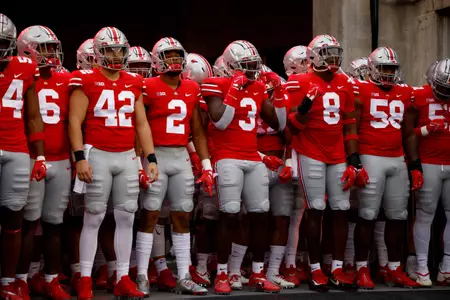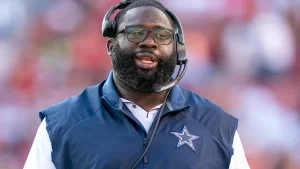
Ohio State football’s national championship, according to Aidan Hutchinson, ought to have an asterisk.
Aidan Hutchinson, a standout defensive player for the Michigan Wolverines, is no stranger to the fierce rivalry between Michigan and Ohio State. Over the years, Hutchinson has expressed his fair share of opinions on various aspects of college football, and one particularly controversial statement he made revolved around Ohio State’s 2014 national championship. According to Hutchinson, the victory should be marked with an asterisk due to circumstances he believed were unfair. This sentiment taps into the emotional and competitive tension that runs deep within the rivalry, but when viewed through a broader lens, Hutchinson’s claim raises several key issues related to fairness, the nature of college football championships, and the unpredictable nature of the sport itself.
The Background of Ohio State’s 2014 National Championship
Ohio State’s national championship run in the 2014-2015 season remains one of the most exciting and talked-about moments in the history of college football. Under head coach Urban Meyer, the Buckeyes capped off an impressive season with a victory over the Oregon Ducks in the College Football Playoff (CFP) National Championship Game. The 42-20 win secured Ohio State’s eighth national title and left a lasting impression on fans and analysts alike. What made this championship run particularly remarkable was the journey the Buckeyes took to get there.
In the preseason, Ohio State had been considered one of the favorites to make a run for the title. They had one of the most talented rosters in the country, including future NFL stars like quarterback J.T. Barrett and defensive back Eli Apple. However, their road to the championship was not as smooth as anticipated. After starting the season with high hopes, Ohio State faced a major setback in November when starting quarterback Braxton Miller was sidelined for the entire season due to a shoulder injury. The Buckeyes’ prospects looked grim, and many pundits predicted that they would not make it to the playoff.
But in stepped J.T. Barrett, a backup quarterback who had a stellar season in Miller’s absence. Unfortunately, Barrett was also injured in the regular-season finale, leaving the team’s national title hopes in jeopardy once again. At this point, Ohio State turned to third-string quarterback Cardale Jones, a player who had barely seen any action during the regular season. Yet, Jones rose to the occasion, leading the Buckeyes to a decisive victory in the Big Ten Championship Game against Wisconsin and earning a spot in the inaugural College Football Playoff.
The Buckeyes’ improbable run to the national title was marked by thrilling victories, including a resounding 59-0 win over Wisconsin in the Big Ten Championship Game, a nail-biting 42-35 victory over Alabama in the Sugar Bowl, and a dominating 42-20 win over Oregon in the national title game. Jones, in particular, became a hero, throwing for over 200 yards and two touchdowns in the championship game and cementing his legacy in Ohio State football history.
The Controversial Statement by Aidan Hutchinson
Despite the national championship victory and the incredible journey that Ohio State took to get there, Aidan Hutchinson’s comments on the 2014 title have sparked heated debates. As a Michigan native and a member of the Michigan Wolverines football team, Hutchinson is part of a fierce rivalry that has seen both teams trade victories and championships over the years. The rivalry is often characterized by pride, passion, and, of course, a fair share of trash talk. In this context, Hutchinson’s assertion that Ohio State’s national championship should carry an asterisk reflects not only the competitive nature of college football but also the tensions between the two schools.
Hutchinson’s argument for the asterisk centers on the fact that Ohio State’s championship run was largely facilitated by the unexpected emergence of third-string quarterback Cardale Jones. Hutchinson, in essence, suggests that the Buckeyes’ national championship was not achieved through conventional means—i.e., the play of their supposed star players—but through a series of fortunate circumstances. Specifically, Hutchinson has mentioned that the Buckeyes’ championship would not have been possible if Miller or Barrett had remained healthy, as both were more established and experienced quarterbacks.
While Hutchinson’s comments can be seen as sour grapes or just another example of rivalry-driven banter, his argument does raise some valid points about fairness and the unpredictable nature of college football. College football, by its very structure, is a sport where championships are often won by teams that overcome significant obstacles, injuries, and challenges. The notion of an “asterisk” is typically associated with situations in which a championship victory is deemed to have been tainted by circumstances that give one team an unfair advantage over the others. In this case, Hutchinson appears to believe that Ohio State’s victory in 2014 was less legitimate due to the unusual situation involving their quarterbacks.
The Nature of College Football Championships
To fully understand Hutchinson’s point, it’s important to take a step back and consider the broader context of college football championships. Unlike professional leagues like the NFL or NBA, college football is unique in its structure. College teams play a limited number of games in the regular season (12 games, plus conference championships, if applicable), and there is no consistent format for determining the champion until the advent of the College Football Playoff system in 2014. Prior to that, the Bowl Championship Series (BCS) tried to determine the top teams for a national championship, but it too was often criticized for subjectivity and bias.
This lack of a definitive, year-round playoff system means that college football championships are often decided by a variety of factors that may not always reflect a team’s true talent. In many cases, championships are determined by matchups, bowl game invitations, and even, as in Ohio State’s case, injuries to key players. Some teams may face difficult challenges in their path to the title, while others might be granted more favorable circumstances, such as avoiding tough competition or drawing weaker opponents.
In this sense, Hutchinson’s call for an asterisk is somewhat of a critique of the randomness of the college football playoff system itself. The reality is that Ohio State’s 2014 national title, though impressive, was the result of an unpredictable chain of events. Had Miller or Barrett remained healthy, would the team have performed as well as they did with Jones? The answer is unclear, and such uncertainty is a hallmark of the sport.
Hutchinson, as a competitor in the Big Ten, is likely more sensitive to this unpredictability, particularly when his own team, Michigan, has had to face Ohio State in such high-stakes matchups. His frustration with the Buckeyes’ victory is rooted in the belief that Ohio State’s path to the title was not as straightforward as it might have been, leading him to suggest that the championship was somehow less valid.
The Unpredictable Nature of Sports
However, it’s worth considering that the unpredictability of sports is part of what makes them so compelling. Injuries and unexpected circumstances are part of every team’s journey, and they are often what separate great teams from merely good ones. Ohio State, despite the challenges they faced, still managed to win the national championship with a third-string quarterback leading the charge. That is a testament to the talent, coaching, and resilience of the team, not something that should necessarily be dismissed because of the way it happened.
In this regard, the idea of marking Ohio State’s championship with an asterisk seems unfair. Sports are not scripted, and championships are not always won by the teams we expect. If we start placing asterisks next to championships because of injuries, changes in personnel, or unexpected outcomes, we risk undermining the essence of sports competition itself.
Moreover, college football, by its nature, is a sport filled with opportunity for the unexpected. It is the story of underdogs, backup players, and players who rise to the occasion when called upon. Cardale Jones, who had little experience prior to the 2014 season, became a hero for Ohio State because he played at an elite level when it mattered most. That is part of the magic of sports, and that kind of story is what makes championships like Ohio State’s so memorable.
A Riveting and Controversial Topic
Aidan Hutchinson’s comments about Ohio State’s 2014 national championship certainly add another layer of intrigue to the ongoing rivalry between Michigan and Ohio State. Whether or not one agrees with his assessment, it brings to light a broader discussion about the nature of sports championships, fairness, and the role of chance in determining the outcome of seasons.
Ohio State’s national title is unlikely to carry an asterisk in the eyes of most fans and analysts, who recognize the tremendous talent, coaching, and resilience required to achieve such success. However, Hutchinson’s perspective offers an interesting lens through which to view the complexities and nuances of college football. It’s a reminder that in sports, there are often no easy answers or clear-cut paths to victory—only stories of perseverance, luck, and unforgettable moments.





